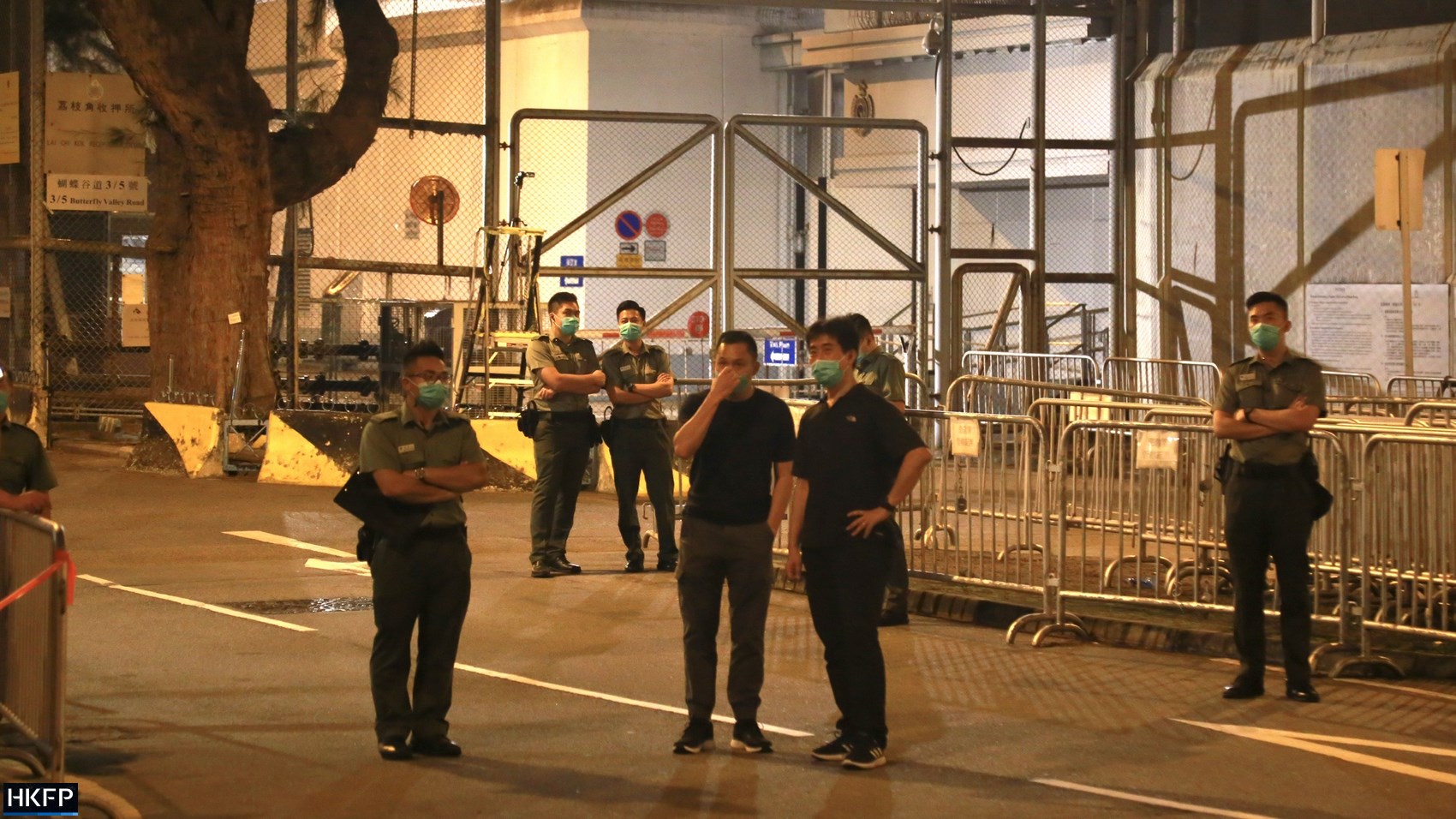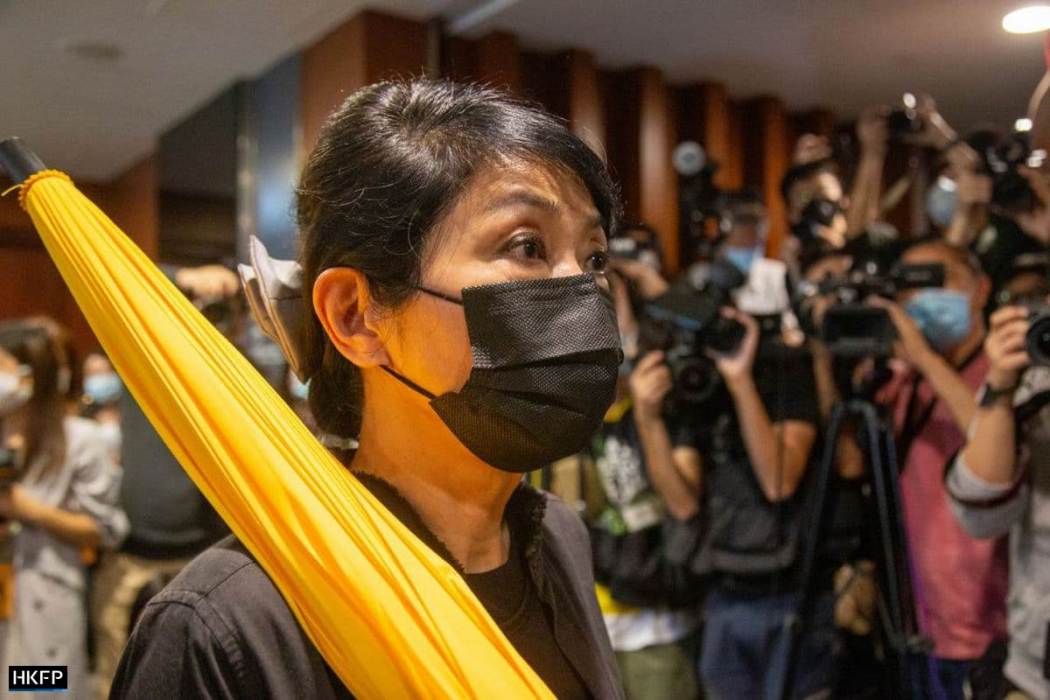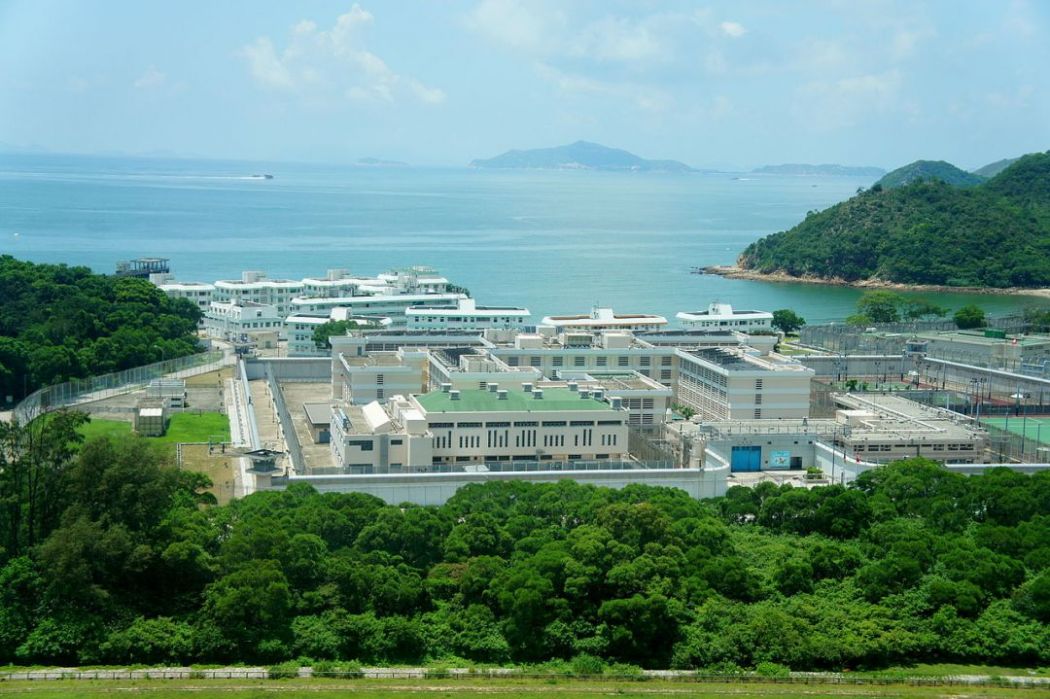Some interesting news is leaking out of local prisons, followed by lurid reactions from officials and their supporters.
The actual event occurred in a women’s prison at Lo Wu. The wardens staged a surprise raid on some inmates’ cells, and discovered some “prohibited items”.

Sources vary on what the “items” were. It appeared from the Security Secretary’s comments on the subject that they comprised M&M chocolates (the only kind prisoners are allowed) and hair clips. Later versions of the story replace the hair clips with “stationery”, which I suppose in this context means writing paper and possibly envelopes.
The six inmates concerned, who apparently included Tiffany Yuen Ka-wai (once a district councillor) were then “disciplined.” No details of this have emerged yet.
Then 18 other prisoners engaged in some kind of protest at the unfairness of the discipline. Cue the arrival of the anti-prison riot squad (The “Black Panthers” – our boys do love those macho nicknames) and dogs. The 18 inmates were then “withdrawn from association”, which sounds like a euphemism for solitary confinement. Ms Yuen was also reported to be in solitary. Naturally this exciting event was reported.
This modest incident turned out to be the mere tip of an iceberg – a pyramid of paranoia over the possible results of putting large numbers of political prisoners inside with the usual customers.

In an ensuing interview, Commissioner of Correctional Services Woo Ying-ming said that some inmates held over national security or public order offences were exercising “unprecedented influence” in local prisons.
It transpired later in the interview that the only evidence for this on offer was that Ms Yuen, on being returned to the women’s prison for a second tour of the legal machinery, received a “hero’s welcome.” Or to be more precise, five other inmates hugged her and held up welcome signs. She has, in words of one syllable, made friends.
But that is not how Mr Woo saw it: “This is how groups begin, like terrorist groups recruiting followers. They help you play tricks in prisons and follow you upon release,” he said, according to the SCMP. “Like triads, they don’t promote the ideology in the beginning. The triads recruit people and take care of them. Then they gradually teach these followers how a triad is run and start spreading the ideology. It is subliminal.”
It is difficult to see why Ms Yuen attracts so much hostility from government supporters. Perhaps her being young, pretty and popular is offensive to people who are none of these things.

Mr Woo went on to complain that prisoners on remand for political offences received “insane” numbers of visitors. He solved this problem by banning all non-official visits on Covid grounds. This seems rather unfair to prisoners who merely wish to be visited by their families but Mr Woo has somehow got the idea that his men are on the “front line” of the fight for national security, so perhaps anything goes.
He also complained that visitors helped prisoners to air complaints. This was intimidating for prison staff. Clearly there are some real problems here, though they have very little to do with national security and nothing at all to do with how terrorists are recruited.
Mr Woo’s orderly realm has been disrupted by an influx of young, articulate members of the educated middle classes. This has led to much more public attention being given to the finer points of the correctional regime than it is accustomed to.
Mr Woo himself made this problem worse by decreeing that all the political prisoners should be dispersed among his prisons to reduce their contact with each other. The unintended consequence of this is, of course, that they have more contact with other inmates of the regular criminal type.

The idea that they are recruiting hordes of followers by judicious manipulation of the prison market in M&Ms, hairclips or stationery, is ridiculous. Every poll, whether of the academic sampling variety or the old-fashioned we-can-all-vote type, has told us that a clear majority of the Hong Kong population supported the aims of the 2019 protests, if not always approving the methods. This is particularly true of the young.
It follows that in any large selection of Hongkongers, whether in prison, university, office or factory, there will be a majority of sympathisers. National security defendants do not need to recruit followers. After all the only crime most of them are accused of is trying to get elected to Legco. Now that the elections are fixed and democrats are banned, why bother?
This has not prevented commentators from picking up Mr Woo’s fears and playing on them. Consider a lengthy piece by Mr Greville Cross, formerly Director of Public Prosecutions and now recycled as our friendly local Lord Haw Haw, called “Prisoner radicalisation: Protecting inmates and reforming fanatics.” Note that Mr Cross views these two categories as covering the entire prisoner population – they are either ordinary decent criminals or fanatics who participated in, or approved of, the 2019 “insurrection”.
After a few paragraphs about local prisons which could have come from the annual report, Mr Cross goes international: “In 2015, Penal Reform International reported that it had been aware for some time that ‘prisons can play a critical role in both triggering and reinforcing the radicalisation process’. In some places, prisoner radicalisation is now a huge problem, and internal arrangements have been reformed. In Europe, for example, many penal institutions have become breeding grounds for Islamic extremism, and this has resulted in terrorist outrages.”
How is this relevant to Hong Kong? Mr Cross says that in a recent book Joshua Wong has confirmed “in terms” that nefarious radicalisation is already happening here. “In terms” seems to be a euphemism for “in my lurid imagination”, because none of the quotes Mr Cross supplies bears this out at all.
Then we come to this: “It would, however, be a mistake to assume that radicalisation only comes about through open practices, and not to acknowledge that softly, softly tactics also play their part. On Aug 27, for example, it was reported that the ex-legislator and national security suspect, Claudia Mo Man-ching, was teaching English to fellow inmates at the Lo Wu Correctional Institution. However surprising, it must be hoped that English is all she is teaching them, and that they are not also being exposed to the vile political ideas which caused such harm in 2019.”

I have two quarrels with this passage. The first one is that Ms Mo is a remand prisoner. She has not yet been tried for anything and consequently is for the moment presumed to be innocent. She is entitled to a fair trial and that means she in entitled to be protected from grossly prejudicial newspaper commentaries. It is both inaccurate and unlawful to imply in print that she is some sort of cross between Rosa Luxemburg and Osama Bin Laden.
I realise that the law on this subject has been much neglected of late, but Mr Cross is a Senior Counsel. Does this not impose some obligations?
I am also surprised by the use of the word “vile.” I presume the political ideas referred to are the subversive notion that Hong Kong should have real elections in which anyone can run and everyone can vote. I realise that many people now maintain that this is an effete Western system inferior to Stalinism with Chinese characteristics, and some of them really believe it. But “vile”?
Is that the best we can do for the ideals of Pericles and Pitt, Lincoln and Locke, in defence of which two generations of my ancestors were willing to “go to their graves like beds”, as the Bard put it?

What seems to be going on here is a form of divide and rule. Anyone who believes in the ideals of 2019 is a fanatic and potential violent terrorist, however harmless he or she may appear. A disinclination to violence, or even a commitment to non-violence, is dismissed as a front.
We are all urged to regard the national security defendants as a tiny militant minority, nothing to do with us, though, Mr Cross charitably urges, in need of enlightenment and reform. “If,” he says charmingly, “hardened robbers, thieves and sex offenders are considered capable of reformation, there is no reason to despair of hardcore fanatics and ideologues.”
I can see little hope of reconciling our little local differences unless government spokespeople official and voluntary can be persuaded to be a little more polite. Not everyone who supported the “five demands” was a fanatic or an ideologue. If we still have a civil society, as the Chief Executive maintains, then its members should be civil.
Support HKFP | Policies & Ethics | Error/typo? | Contact Us | Newsletter | Transparency & Annual Report | Apps
| HKFP is an impartial platform & does not necessarily share the views of opinion writers or advertisers. HKFP presents a diversity of views & regularly invites figures across the political spectrum to write for us. Press freedom is guaranteed under the Basic Law, security law, Bill of Rights and Chinese constitution. Opinion pieces aim to point out errors or defects in the government, law or policies, or aim to suggest ideas or alterations via legal means without an intention of hatred, discontent or hostility against the authorities or other communities. |
Help safeguard press freedom & keep HKFP free for all readers by supporting our team

More HKFP OPINION:
HKFP has an impartial stance, transparent funding, and balanced coverage guided by an Ethics Code and Corrections Policy.
Support press freedom & help us surpass 1,000 monthly Patrons: 100% independent, governed by an ethics code & not-for-profit.










